高中英语人教版必修3 Unit 1 Festivals around the world Grammar情态动词课件(24张ppt)
文档属性
| 名称 | 高中英语人教版必修3 Unit 1 Festivals around the world Grammar情态动词课件(24张ppt) |  | |
| 格式 | zip | ||
| 文件大小 | 872.5KB | ||
| 资源类型 | 教案 | ||
| 版本资源 | 人教版(新课程标准) | ||
| 科目 | 英语 | ||
| 更新时间 | 2019-04-12 08:07:39 | ||
图片预览

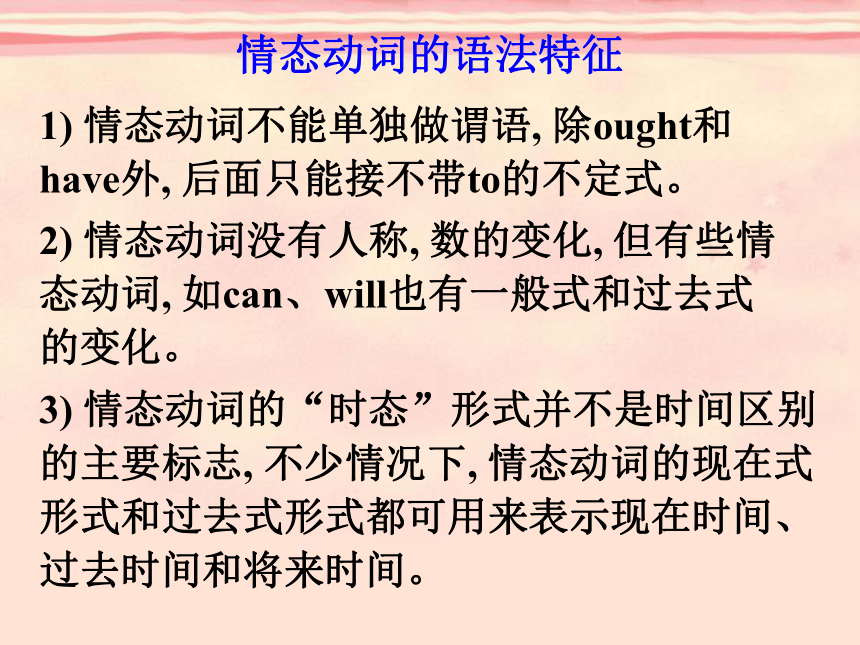
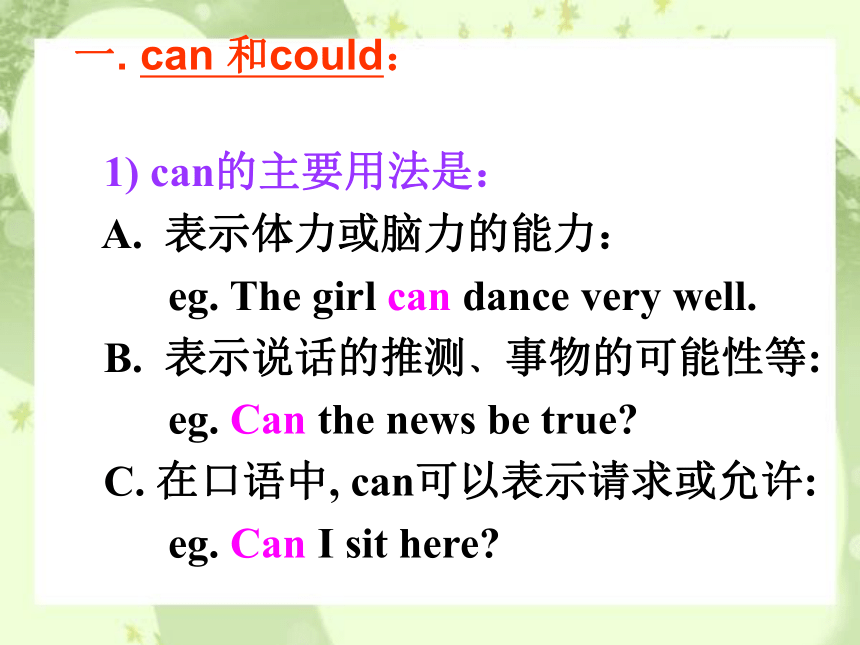

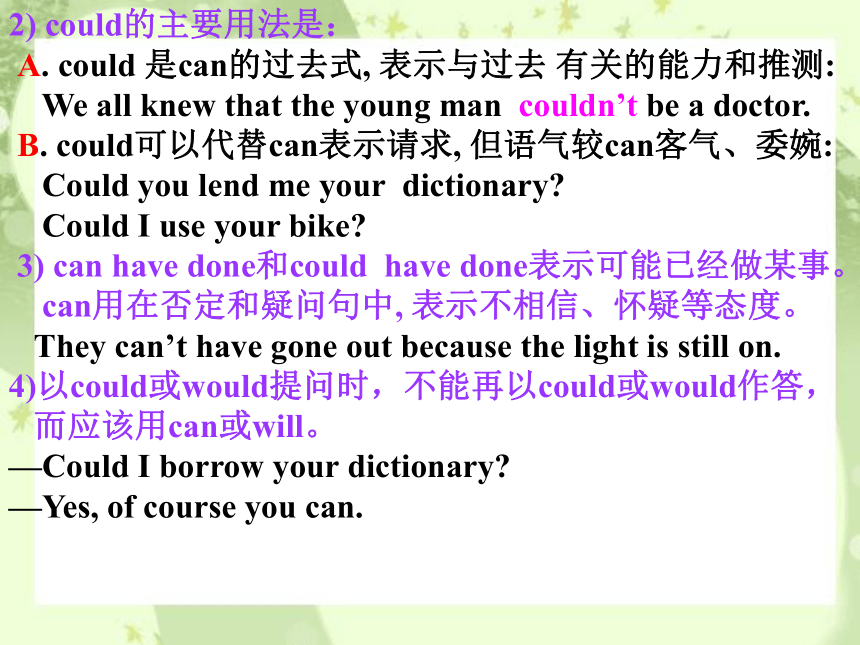
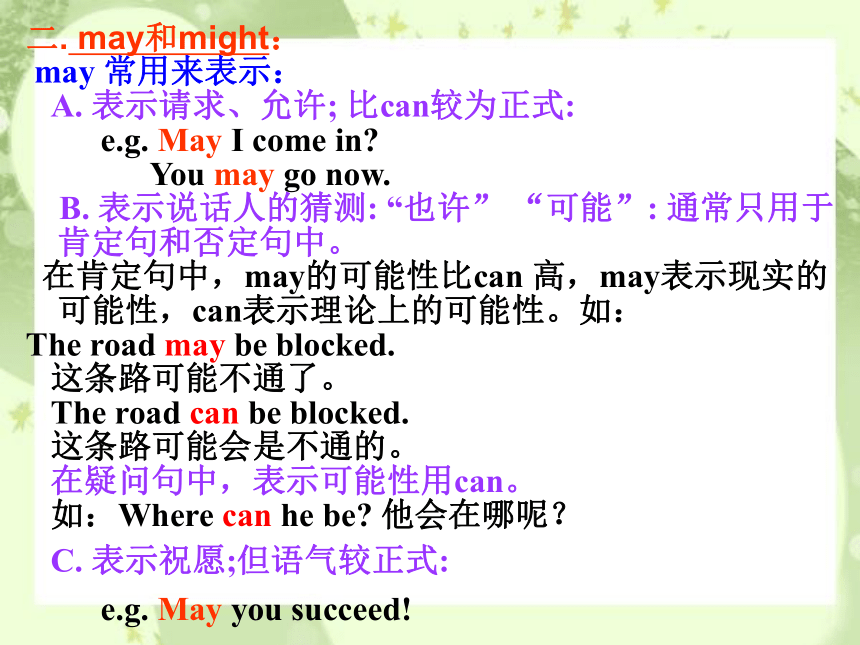


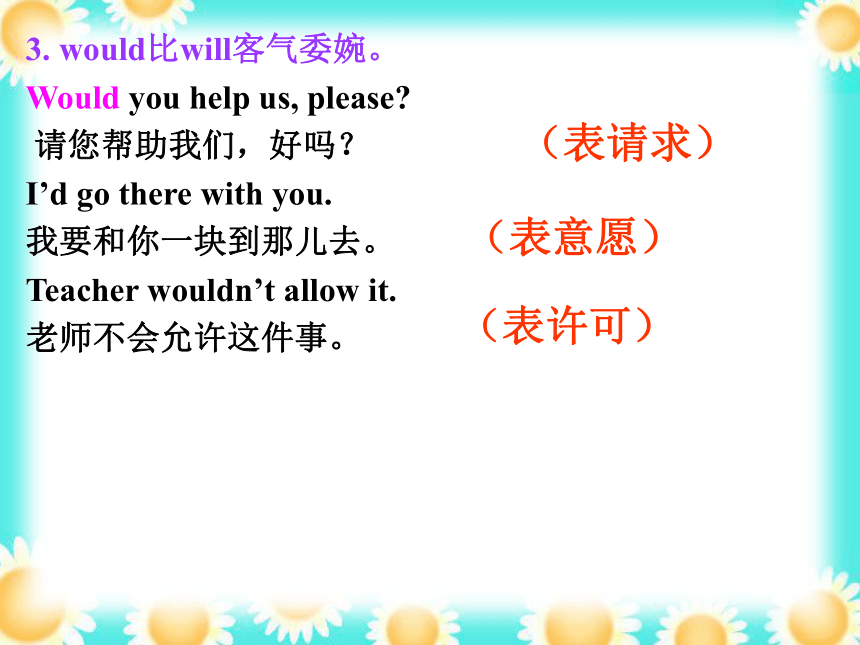
文档简介
情态动词的语法特征
1) 情态动词不能单独做谓语, 除ought和have外, 后面只能接不带to的不定式。
2) 情态动词没有人称, 数的变化, 但有些情态动词, 如can、will也有一般式和过去式的变化。
3)?情态动词的“时态”形式并不是时间区别的主要标志, 不少情况下, 情态动词的现在式形式和过去式形式都可用来表示现在时间、过去时间和将来时间。
1) can的主要用法是:
? A.? 表示体力或脑力的能力:
? eg. The girl can dance very well.
B.? 表示说话的推测﹑事物的可能性等:
eg. Can the news be true?
C. 在口语中, can可以表示请求或允许:
eg. Can I sit here?
一. can 和could:
can表示“能够”时与短语be able to同义,但can只用于一般现在时或过去时,而后者可用于各种时态。另外,can表示个人有某种能力,而be able to表示某人通过努力、克服困难做成某事,相当于succeed in doing sth.;叙述过去事实时,最好用was / were able to,因为could只表示过去具有某种能力。
如:
Can you understand the different kinds of English these people are using?
Two years later, he was able to speak very good Chinese.
2) could的主要用法是:
A. could 是can的过去式, 表示与过去 有关的能力和推测:
We all knew that the young man couldn’t be a doctor.
B. could可以代替can表示请求, 但语气较can客气、委婉:
Could you lend me your dictionary?
Could I use your bike?
3) can have done和could have done表示可能已经做某事。
can用在否定和疑问句中, 表示不相信、怀疑等态度。
They can’t have gone out because the light is still on.
4)以could或would提问时,不能再以could或would作答,
而应该用can或will。
—Could I borrow your dictionary?
—Yes, of course you can.
二. may和might:
may 常用来表示:
?A. 表示请求、允许; 比can较为正式:
?? e.g. May I come in?
You may go now.
B. 表示说话人的猜测: “也许” “可能”: 通常只用于肯定句和否定句中。
在肯定句中,may的可能性比can 高,may表示现实的可能性,can表示理论上的可能性。如:
The road may be blocked.
这条路可能不通了。
The road can be blocked.
这条路可能会是不通的。
在疑问句中,表示可能性用can。
如:Where can he be? 他会在哪呢?
C. 表示祝愿;但语气较正式:
e.g. May you succeed!
might 的用法:
多在间接引语中表示过去的可能和允许。如:
She said that he might take her bike.
她说他可以拿她的自行车去用。
表示现在的许可, 语气比may较委婉, 一般用于疑问句(包括间接疑问句), 不可用于肯定句或者否定句。
如: Might I have a word with you?
我可以和你说句话吗?
三. will和would:
1. will用于构成将来时是助动词。用于表示“意志”“决心”“请求”是情态动词。would亦同理。
e.g. I will tell you something important.
我要告诉你一些重要的事。(助动词)?
Will you tell her that I’m here?
请您告诉她说我在这儿,好吗?
(情态动词) ?
2. 在疑问句中用于第二人称,提出请求或询问。
e.g.: If you want help - let me know, will you?
如果你需要帮助, 让我知道, 好吗?
3. would比will客气委婉。
Would you help us, please?
请您帮助我们,好吗?
I’d go there with you.
我要和你一块到那儿去。?
Teacher wouldn’t allow it.
老师不会允许这件事。
(表请求)
(表意愿)
(表许可)
四. shall和should:
1. shall用于构成将来时是助动词。
shall用于征求对方的意见,表示 “决心” 是情态动词。
Perhaps I shall pay a visit to England this winter.
可能今年冬天我会去英国观光.(一般将来时, 助动词)
Shall we go by train, Mom?
妈妈,我们乘火车去好吗?
(用于征求对方的意见,情态动词)
I shall go at once.
我必须立即去。
(表 “决心”,情态动词)
shall可以用于第一、三人称的疑问句,表示征求意见或许可;还可用于第二、三人称的陈述句中,表示允诺、警告、命令或威胁等。如:
You shall be punished if you break the rule.
2. should表示义务、建议、劝告,意为 “应该”。 “should+ have+过去分词”
表示本应该做但没有做。
eg: You should keep your promise.
你应该遵守诺言。
She should have passed the exam.
她应该通过考试的。
五. must和 have?to
1. must用于一般问句中, 肯定回答用must
否定式用?needn’t或don’t have to,?“不必”,
mustn’t表示“禁止,不允许”
?— Must?I?finish?all?assignments?at?a?time?
??—Yes, you must.
No,?you?needn't.
2. must着重说明主观看法,have?to?强调客观需要。
另外,have?to?能用于更多时态。
I don’t like this TV set. We must buy a new one.
There was no more bus. They had to walk home.
He?must?be?joking. There?is?nobody?here.?They?must?have?all gone?home.
3. must表示对某人某事的猜测, 作“准是”, “一定” , 一般用于肯定句中。对过去发生的事情作肯定判断用must have done。
六. need
(1)modal v. 必要, 必须(多用于否定和疑问句,后接动词原形)
needn’t
needn’t have done:不必做过……
①You needn’t have get up so early this morning.
② ---Need I go now?
---Yes, you must.
---No, you needn’t / you don’t have to.
(2)v.需要
don’t need to do
sb need to do sth.
sth need doing.
I need to read the letter first.
The radio needs repairing.
七. dare
(1)modal: v(过去式dared) 敢 (多用于疑问、否定或条件句中,第三人称不加-s,后接动词原形。否定式为dare not / daren’t)
How dared you say that to his parents?
Dare you walk alone in the dark?
He daren’t speak English in public, dare he?
(2)v. (dared, dared)敢, 胆敢(在肯定句中, 用dare to do; 在否定和疑问句中, to可省略)
I dared to swim across the river.
Does he dare answer this question?
—I think I’ll give Bob a ring later
in the week.
—You _____. You haven’t been in
touch with him for ages.
A. will B. may
C. have to D. should
D
练习坊
Choose the correct answer.
2. John, look at the time. _____ you play
the piano at such a late hour?
A. Must B. Can
C. May D. Should
A
3. There _____ any difficulty about
passing the road test since you have
practiced a lot in the driving school.
A. mustn’t be B. shan’t have
C. shouldn’t be D. needn’t have
C
4. The World Wide Web is sometimes
jokingly called the World Wide Wait
because it ______ be very slow.
A. should B. must C. will D. can
5. Helen _____ go on the trip with us,
but she isn’t quite sure yet.
A. shall B. must
C. may D. can
D
C
6. —Someone is knocking at the door.
_____ it be Venis?
—No, it _____ be her; she left for
New York this morning.
A. Can; mustn’t
B. Might; can’t
C. May; doesn’t
D. Can; can’t
D
7. Mike promised his doctor he _____
not drink, and he has never drunk
ever since.
A. might B. should
C. could D. would
D
8. —Is there a movie on in the cinema
tonight?
—There _____ be. I will phone the
cinema and find it out.
A. might B. should
C. can D. must
A
9. When I was studying at Beijing
University, I _____ take a walk along
the lake every evening.
A. will B. would
C. could D. shall
B
10. Mr Brown, many students want to
see you. _____ they wait here or
outside?
A. Shall B. Will
C. Can D. Would
A
1) 情态动词不能单独做谓语, 除ought和have外, 后面只能接不带to的不定式。
2) 情态动词没有人称, 数的变化, 但有些情态动词, 如can、will也有一般式和过去式的变化。
3)?情态动词的“时态”形式并不是时间区别的主要标志, 不少情况下, 情态动词的现在式形式和过去式形式都可用来表示现在时间、过去时间和将来时间。
1) can的主要用法是:
? A.? 表示体力或脑力的能力:
? eg. The girl can dance very well.
B.? 表示说话的推测﹑事物的可能性等:
eg. Can the news be true?
C. 在口语中, can可以表示请求或允许:
eg. Can I sit here?
一. can 和could:
can表示“能够”时与短语be able to同义,但can只用于一般现在时或过去时,而后者可用于各种时态。另外,can表示个人有某种能力,而be able to表示某人通过努力、克服困难做成某事,相当于succeed in doing sth.;叙述过去事实时,最好用was / were able to,因为could只表示过去具有某种能力。
如:
Can you understand the different kinds of English these people are using?
Two years later, he was able to speak very good Chinese.
2) could的主要用法是:
A. could 是can的过去式, 表示与过去 有关的能力和推测:
We all knew that the young man couldn’t be a doctor.
B. could可以代替can表示请求, 但语气较can客气、委婉:
Could you lend me your dictionary?
Could I use your bike?
3) can have done和could have done表示可能已经做某事。
can用在否定和疑问句中, 表示不相信、怀疑等态度。
They can’t have gone out because the light is still on.
4)以could或would提问时,不能再以could或would作答,
而应该用can或will。
—Could I borrow your dictionary?
—Yes, of course you can.
二. may和might:
may 常用来表示:
?A. 表示请求、允许; 比can较为正式:
?? e.g. May I come in?
You may go now.
B. 表示说话人的猜测: “也许” “可能”: 通常只用于肯定句和否定句中。
在肯定句中,may的可能性比can 高,may表示现实的可能性,can表示理论上的可能性。如:
The road may be blocked.
这条路可能不通了。
The road can be blocked.
这条路可能会是不通的。
在疑问句中,表示可能性用can。
如:Where can he be? 他会在哪呢?
C. 表示祝愿;但语气较正式:
e.g. May you succeed!
might 的用法:
多在间接引语中表示过去的可能和允许。如:
She said that he might take her bike.
她说他可以拿她的自行车去用。
表示现在的许可, 语气比may较委婉, 一般用于疑问句(包括间接疑问句), 不可用于肯定句或者否定句。
如: Might I have a word with you?
我可以和你说句话吗?
三. will和would:
1. will用于构成将来时是助动词。用于表示“意志”“决心”“请求”是情态动词。would亦同理。
e.g. I will tell you something important.
我要告诉你一些重要的事。(助动词)?
Will you tell her that I’m here?
请您告诉她说我在这儿,好吗?
(情态动词) ?
2. 在疑问句中用于第二人称,提出请求或询问。
e.g.: If you want help - let me know, will you?
如果你需要帮助, 让我知道, 好吗?
3. would比will客气委婉。
Would you help us, please?
请您帮助我们,好吗?
I’d go there with you.
我要和你一块到那儿去。?
Teacher wouldn’t allow it.
老师不会允许这件事。
(表请求)
(表意愿)
(表许可)
四. shall和should:
1. shall用于构成将来时是助动词。
shall用于征求对方的意见,表示 “决心” 是情态动词。
Perhaps I shall pay a visit to England this winter.
可能今年冬天我会去英国观光.(一般将来时, 助动词)
Shall we go by train, Mom?
妈妈,我们乘火车去好吗?
(用于征求对方的意见,情态动词)
I shall go at once.
我必须立即去。
(表 “决心”,情态动词)
shall可以用于第一、三人称的疑问句,表示征求意见或许可;还可用于第二、三人称的陈述句中,表示允诺、警告、命令或威胁等。如:
You shall be punished if you break the rule.
2. should表示义务、建议、劝告,意为 “应该”。 “should+ have+过去分词”
表示本应该做但没有做。
eg: You should keep your promise.
你应该遵守诺言。
She should have passed the exam.
她应该通过考试的。
五. must和 have?to
1. must用于一般问句中, 肯定回答用must
否定式用?needn’t或don’t have to,?“不必”,
mustn’t表示“禁止,不允许”
?— Must?I?finish?all?assignments?at?a?time?
??—Yes, you must.
No,?you?needn't.
2. must着重说明主观看法,have?to?强调客观需要。
另外,have?to?能用于更多时态。
I don’t like this TV set. We must buy a new one.
There was no more bus. They had to walk home.
He?must?be?joking. There?is?nobody?here.?They?must?have?all gone?home.
3. must表示对某人某事的猜测, 作“准是”, “一定” , 一般用于肯定句中。对过去发生的事情作肯定判断用must have done。
六. need
(1)modal v. 必要, 必须(多用于否定和疑问句,后接动词原形)
needn’t
needn’t have done:不必做过……
①You needn’t have get up so early this morning.
② ---Need I go now?
---Yes, you must.
---No, you needn’t / you don’t have to.
(2)v.需要
don’t need to do
sb need to do sth.
sth need doing.
I need to read the letter first.
The radio needs repairing.
七. dare
(1)modal: v(过去式dared) 敢 (多用于疑问、否定或条件句中,第三人称不加-s,后接动词原形。否定式为dare not / daren’t)
How dared you say that to his parents?
Dare you walk alone in the dark?
He daren’t speak English in public, dare he?
(2)v. (dared, dared)敢, 胆敢(在肯定句中, 用dare to do; 在否定和疑问句中, to可省略)
I dared to swim across the river.
Does he dare answer this question?
—I think I’ll give Bob a ring later
in the week.
—You _____. You haven’t been in
touch with him for ages.
A. will B. may
C. have to D. should
D
练习坊
Choose the correct answer.
2. John, look at the time. _____ you play
the piano at such a late hour?
A. Must B. Can
C. May D. Should
A
3. There _____ any difficulty about
passing the road test since you have
practiced a lot in the driving school.
A. mustn’t be B. shan’t have
C. shouldn’t be D. needn’t have
C
4. The World Wide Web is sometimes
jokingly called the World Wide Wait
because it ______ be very slow.
A. should B. must C. will D. can
5. Helen _____ go on the trip with us,
but she isn’t quite sure yet.
A. shall B. must
C. may D. can
D
C
6. —Someone is knocking at the door.
_____ it be Venis?
—No, it _____ be her; she left for
New York this morning.
A. Can; mustn’t
B. Might; can’t
C. May; doesn’t
D. Can; can’t
D
7. Mike promised his doctor he _____
not drink, and he has never drunk
ever since.
A. might B. should
C. could D. would
D
8. —Is there a movie on in the cinema
tonight?
—There _____ be. I will phone the
cinema and find it out.
A. might B. should
C. can D. must
A
9. When I was studying at Beijing
University, I _____ take a walk along
the lake every evening.
A. will B. would
C. could D. shall
B
10. Mr Brown, many students want to
see you. _____ they wait here or
outside?
A. Shall B. Will
C. Can D. Would
A
同课章节目录
